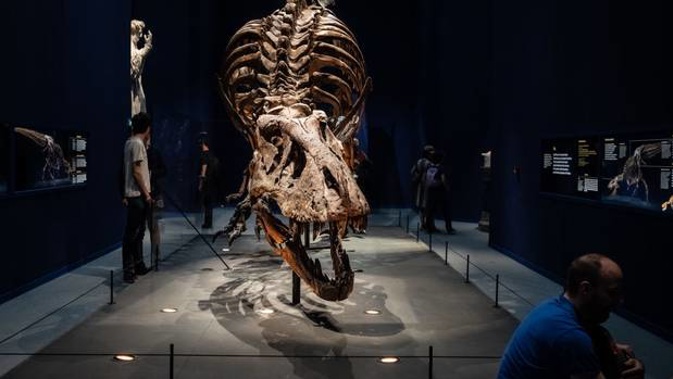
The 68-million-year-old remains of a young Tyrannosaurus rex are now up for grabs on eBay, appearing, alongside 50-piece dinosaur play sets and fiery-eyed T. rex action figures. The 15-foot skeleton, possibly the only in existence, can be had for the "buy it now" price of $2.95 million.
Alan Detrich, the professional fossil hunter who unearthed it, says that's a bargain - "chump change" he says - for such a rare find. But that's a problem, say scientists, who believe the find is an invaluable piece of our collective history and a critical clue to understanding the prehistoric predator, reports The Washington Post.
"The fossil record is analogous to the memory of the Earth," said Thomas Carr, a paleontologist at Carthage College in Wisconsin. "Fossils are the only information we have about how life on this planet evolved."
The debate over fossil sales is an old one, though it's grown more heated now that dinosaur relics have become trophies among the ultrarich and such celebrities as Leonardo DiCaprio, Russell Crowe and Nicolas Cage. The most coveted fossils are prime fodder for auction houses, where they can fetch millions. Last summer, for example, a nearly complete skeleton of a potentially new species of carnivorous dinosaur was sold by the Parisian auction house Aguttes for $2.36 million. The private, U.S.-based buyer took ownership before scientists had a chance to study and identify it.
The climb in prices makes it tougher for museums and public institutions to compete with wealthy collectors. And once these specimens are put in private hands, they're more or less lost to science, experts say.
"The sale of fossils depreciates information, because it's unethical to study specimens that are not in a public trust," Carr said, because privately owned fossils preclude independent analysis and verifying findings.
This sale is particularly vexing, Carr said, because of the scarcity of juvenile T. rex fossils has left paleontologists with gaps in their understanding of the dinosaur's life. He casts commercial fossil hunters as "thieves of time."
"Absolutely every additional fossil is critical to get a picture of what a young T. rex was like," Carr said.
Detrich, 71, who is not a paleontologist, discovered the T. rex on private land he'd leased in Jordan, Montana, in 2013. In the United States, fossils found on private land belong to whomever digs them up. Most fossil-rich counties, such as China and Mongolia, have strict laws surrounding the collection and sale of fossils. Cage famously had to give up a Tyrannosaurus bataar skull he'd outbid DiCaprio for in 2007 because it may have been illegally smuggled out of Mongolia.
Once experts helped Detrich understand what he had - the bones of a 4-year-old T. rex - he decided to lend it to the Natural History Museum at the University of Kansas, near his home in Lawrence, in 2017. He said he thought the public ought to see it.
But last week, without warning the university, he listed the T. rex on eBay. His first post emphasized the fossil's prominent display at the school as a key selling point.
The museum was quick to clarify that it was not involved in the sale, and that the fossil was being removed and returned to Detrich. In a statement, museum Director Leonard Krishtalka also said Detrich had been asked to remove references to the university from the listing.
The move also drew criticism from the broader academic and scientific communities. The Society of Vertebrate Paleontology wrote an open letter decrying the sale of the baby T. rex, highlighting that the price tag would likely ensure the specimen ended up with a private owner, robbing scientists and the public of the chance to learn from it further.
"That fossils like this are evidence of Earth's deep past is what makes them valuable, unlike art objects or other items of trade whose value comes from human creativity and artistry," the letter said. "Each one that is lost from the public trust, is part of that already fragmentary history that we will never collectively recover."
But many professional fossil sellers reject the idea that specimens in private hands are lost to science. Michael Triebold, who has been commercially collecting fossils for more than 30 years, said that museums often depend on companies like his for their exhibits. He also refuted the idea that specimens should be kept in the public trust.
"Specimens are borrowed and never returned, specimens are stolen, lost through a variety of means including laziness and incompetence," Triebold wrote in an email to The Washington Post. "I dare suggest that a privately-owned fossil of any scientific significance is cared-for better than one in the public trust."
Detrich bristles at the suggestion that he's only interested in money and has no respect for history. Without him, he said, the skeleton would still be buried beneath the dirt, hidden and anonymous. He said he's given scientists and the public ample access to the T. rex these past two years. Now, he contends, he deserves to be compensated.
Detrich has yet to receive an offer but says he's heard from prospects all over the world and that some people have even asked about shipping costs. The listing is averaging 116 views an hour on eBay.
For a man whose wares are millions of years old, Detrich's views hinge on the ephemeral: "Billionaires die just like the rest of us. It'll end up in a museum someday. What does it matter if it's not for another 20 years?"
Take your Radio, Podcasts and Music with you









